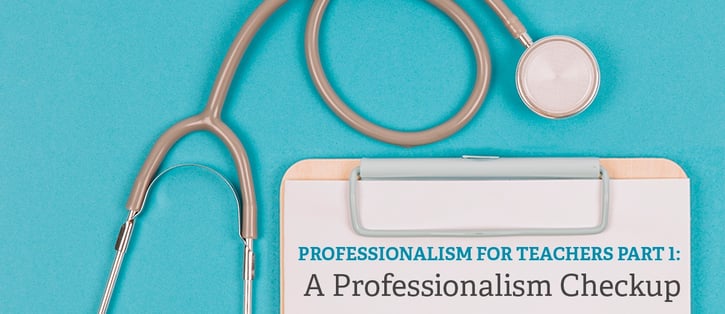
Public education teachers are professionals. They see themselves as such, and rightly so. There is a great deal of training and education to become a teacher, and it is a position of respect in most communities. The role requires both customer service skills and technical know-how that surpasses average employees.
As it is a professional role, it matters if teachers are demonstrating professionalism on a daily basis. There are many reasons why it matters, but more than anything, it comes back to our attitude. Because what we are doing is so very important, we need to treat it as such.
Here is an analogy that may help teachers understand why professionalism is so important: If a doctor came into a patient room to discuss cancer treatment with the patient, he would expect a degree of professionalism in dress, language, and confidentiality. Just by “looking the part,” speaking clearly and with authority, and demonstrating expertise in the field, the doctor has credibility and trust from the patient. If these were lacking, the patient may not trust the doctor he is working with and, in turn, may not take his or her advice about treatment.
The same is true of teachers. If we want those around us to treat us like professionals, we must demonstrate professionalism in what we do. If we want parents to trust us and heed our advice, we need to communicate like professionals. If parents have questions about curriculum and instruction, we teachers should know the latest research and best practices in our field.
If you are ready for a “professionalism checkup” as a teacher, here are some areas of reflection to think about:
- Do I always demonstrate outstanding communication skills?
Communicating as a professional is crucial for teachers. When meeting with parents in person or speaking with them on the phone, teachers must sound professional and use correct grammar. The same is true when writing to parents via email. It is even important to provide good oral and written feedback to students when grading. We must model good communication and demonstrate its importance to our students.
- Am I reliable for my students, colleagues, parents, and principal?
One of the areas that I hear about most from employers is the need for employees to “show up and show up on time.” As a teacher, this should be a no-brainer, but it is still important to remember. Even showing up on time to meetings, IEPs, and professional development is important. We aren’t just professionals for a few hours a day—we are professionals at all times.
- Do I use sarcasm to joke with my students?
For some teachers, this would probably be a surprising addition to the list. A sense of humor with students is an important trait for teachers to have, but using sarcasm in the classroom is inappropriate. Just the other day, my 8th grade daughter mentioned something a teacher told her. I said that he was probably joking (it was obvious sarcasm to me), but she wasn’t so sure. This is why we shouldn’t use sarcasm in the classroom. At times it can be very biting and almost mean-spirited. But even if not, it is hard for many students to understand—especially those who struggle with context clues and reading between the lines. Sarcasm can be confusing, and therefore not funny, for many students. I have found there is almost always a better way to joke with students then using sarcasm.
- Do I keep up on my knowledge of profession?
Being current on best practices and current research is critical as a professional. Teaching is not like other professions, such as medicine or technology, in the sense that there is not a rapidly changing flow of new research. But there are studies that both confirm what we do and challenge some of our current practices.
- Am I demonstrating professional dress?
This one isn’t high on the list, but it does matter. Just like judging a doctor by how they look the part, teachers are judged in the same manner. Dressing down for a jeans day or spirit day is fine because parents and students see that as a “uniform.” On other days—especially those that include interaction with parents—teachers should dress professionally.
Teachers should ask themselves each of these questions and reflect while asking themselves, “Am I doing everything I can to be viewed as a trusted professional?” If the answer is “no” or even “maybe not,” then teachers should do what they need to for the sake of their students, their school, and their profession.
Be sure to look out for the second part of our Professionalism for Teachers series next week. For more teaching tips, and to stay up to date on the latest in education and education technology, be sure to subscribe to our Educator blog.


